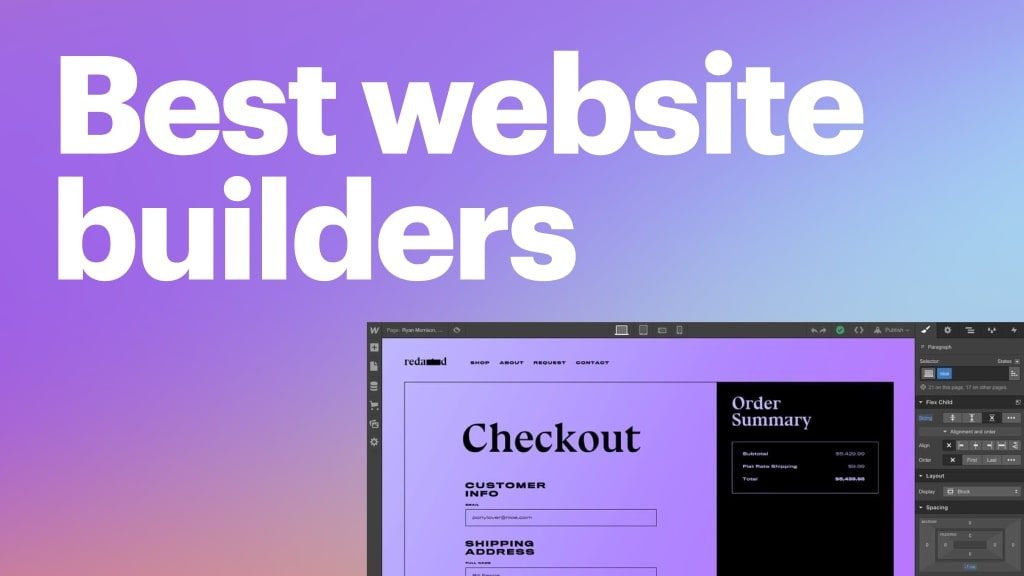In today’s digital landscape, establishing a robust online presence for your business is a prerequisite for success. A well-crafted website not only showcases your offerings but also serves as a powerful tool for attracting and engaging potential customers. The realm of website builders has evolved significantly, and in 2023, there are numerous exceptional options available that can empower you to create a website that truly stands out. In this comprehensive guide, we’ll delve into the top website builders of 2023, dissect their unique strengths, and provide you with the insights you need to make an informed decision for your business.

Unveiling the Powerhouses: The Best 10 Website Builders of 2023
GoDaddy: Pioneering Simplicity and Versatility
Why we chose GoDaddy: Works great for mobile sites
| PROS | CONS |
|
Easy to set up and use
Includes advanced marketing tools
Integrations with eBay, Etsy, Facebook, and more
|
Unable to add custom code
Unable to export content |
Web.com: User-Friendly Excellence with Templates Galore
Why we chose Web.com: We like that Web.com is straightforward and simple to use, making it a great choice if you’re looking to get online fast.
Our experience: We think Web.com is a solid option for beginners, although its editor may feel a bit clunky until you get the hang of it. We especially liked the variety of templates you can use when getting started.
PROS |
CONS |
|
Well-designed templates
Free stock images and photos
One hour of support from a web design expert
|
Limited customization options
No free trial
|
Squarespace: Marrying Visual Appeal and Functionality
Network Solutions: Swift Solutions for a Solid Foundation
HubSpot: Where Marketing Meets Web Design
IONOS: Elevating E-commerce with Upselling and Cross-Selling
Jimdo: AI-Driven Design for Self-Employed Professionals
SITE123: Intuitive Editing for Effortless Website Creation
HostGator: Budget-Friendly Brilliance
Fiverr: Connecting You with Design Experts
Navigating the Landscape: Making the Right Choice
The landscape of website builders is diverse, each offering a unique blend of features and capabilities. While the options are plentiful, making the right choice hinges on understanding your specific needs and priorities. Here’s a roadmap to guide your decision-making process:
1. Define Your Site Type and Purpose
Before delving into the features, identify the primary purpose of your website. Whether it’s an e-commerce store, a blog, a portfolio, or a business site, clarifying your objectives will steer you toward the builder that aligns with your vision.
2. Consider Your Budget and Long-Term Goals
Budget considerations are paramount. While many builders offer free plans with limitations, it’s essential to evaluate the long-term cost of maintaining your website. Costs typically range from $150 to $600 per year, depending on the features and level of customization you require.
3. Weigh Design Flexibility and Customization
Balancing design flexibility with ease of use is crucial. Builders like Squarespace and Wix provide a rich canvas for creative expression, while platforms like Jimdo and SITE123 offer guided design through AI-driven tools. Evaluate your comfort level with customization to determine the right fit.
4. Explore Monetization Avenues
Your website has the potential to be a revenue generator. Builders offer various monetization options, including ads, online stores, affiliate marketing, memberships, courses, and sponsored content. Select a platform that aligns with your monetization strategy.
5. Anticipate Future Growth
Scalability is a consideration that’s often overlooked. As your business evolves, your website’s demands might change. Opt for a builder that accommodates growth, whether it’s in terms of traffic, products, or content.
6. Embrace Templates, Storage, and Bandwidth
The quality of templates, along with storage and bandwidth allocations, contributes to your website’s overall performance. Opt for a builder that offers a diverse range of high-quality templates and ample resources to ensure your site operates smoothly.
Exploring Beyond: Alternative Solutions
While the top 10 builders have captured our attention, it’s worth exploring alternative solutions that might align more closely with your unique needs. Consider options such as WordPress.com, BoldGrid, Weebly, Zyro, and Hibu. These platforms offer distinct advantages and could be the perfect match for your specific requirements.
Elevating Your Online Presence
In the dynamic world of web development, the choices are abundant, and each platform offers a set of tools that cater to different niches. Armed with the knowledge of the top website builders in 2023 and a comprehensive understanding of your own needs, you’re poised to elevate your online presence to unprecedented heights. Choose wisely, and let your website become a testament to your brand’s excellence.
Posts same category:
Lindy AI Review: Build Your First AI Employee in Minutes
Smoobu Review 2025: Best Vacation Rental Management Software for Hosts
Duet Display Review 2025: Best Second Screen & Remote Desktop App?
Site123 Review: The Ultimate Website Builder